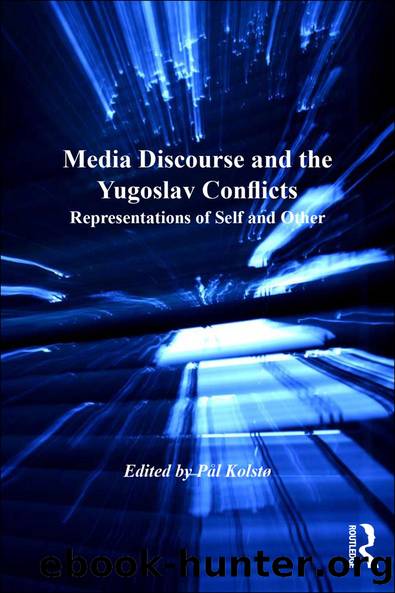Media Discourse and the Yugoslav Conflicts by Pål Kolstø

Author:Pål Kolstø [Kolstø, Pål]
Language: eng
Format: epub
Tags: Nonfiction, Social & Cultural Studies, Social Science, Anthropology
ISBN: 9781317098911
Publisher: Taylor and Francis
Published: 2016-04-29T04:00:00+00:00
The Report of the Badinter Commission and the Constitution of the FRY
Montenegrin reactions to the Badinter Commissionâs report in 1991 marked the beginning of a new rhetoric which insisted that state independence could also be pursued in a situation of cultural and national similarities. This was the first time that Serbia and Montenegro were mentioned as independent and separate political entities. Their joint life was not brought into question, but neither was it regarded as self-evident. Rather, it was linked to the freely expressed will of the citizens. This attitude was taken vis-Ã -vis the international community in response to the Badinter Commissionâs offer to the republics to hold a referendum on independence, which would be recognized by the European Community as the basis for their independence. At first, Montenegro accepted this offer, but this acceptance was later qualified.
This period is interesting because of the variety of discursive strategies of keeping silent and concealing the acceptance of this offer. In the above-mentioned media it was not possible to find the statement made by the Montenegrin President, Momir BulatoviÄ, to the effect that Montenegro would ask the European Community to recognize its statehood. It is only possible to find the subsequent interpretations and a direct denial by BulatoviÄ himself (Novosti, 6 December 1991). According to the media, the statehood of Serbia and Montenegro had not been in question since the Berlin Congress in 1878, so a new application for the recognition of statehood was senseless and had no legal grounds. The media in Serbia and Montenegro tried to conceal any differences in their political views. According to the Serbian media, the protests in Montenegro were staged against something that never was (âProtests of the Peopleâs Front of Yugoslavia in front of the Assembly of the SFRY and in Titogradâ). The media also printed excerpts from the dramatic speech made by Matija BeÄkoviÄ at a meeting in Herceg Novi, in which he mentioned only one people who should make the decision: âThese are decisive days for the Serbian people who stand at a crossroads and by the crucifix. We must select our path at the crossroads and take our aim and hope from the crucifix. We do not attack anyone but, as can be seen, we must defend what is oursâ (Novosti, 25 December 1991).2
This âonenessâ of Serbia and Montenegro was more crystallized when it came to the attitude toward the international community. In this context, âWeâ was Yugoslavia, or Serbia and Montenegro. The news and articles were taken in full from the Tanjug News Agency. No news deviated from the media course chartered by Belgrade. An article carrying the headline âReckoning without the Hostâ (RaÄun bez krÄmara, Pobjeda, 8 December 1991), which analysed the effects of the Badinter Commissionâs report, was a text taken from the Tanjug News Agency. Throughout the entire text there was no mention of Montenegro as one of the potentially independent republics. It dealt exclusively with the report and its effect on Serbia, and argued that other republics had secessionist intentions which contravened the constitution of the SFRY.
Download
This site does not store any files on its server. We only index and link to content provided by other sites. Please contact the content providers to delete copyright contents if any and email us, we'll remove relevant links or contents immediately.
Chaco's Northern Prodigies : Salmon, Aztec, and the Ascendancy of the Middle San Juan Region after AD 1100 by Paul F. Reed(367)
Digital International Relations by Unknown(366)
Law Enforcement Interpersonal Communication and Conflict Management by Brian Douglas Fitch(358)
Skilled interpersonal communication: Research, theory and practice, Fifth edition by Owen Hargie(338)
The Enduring Color Line in U.S. Athletics by Krystal Beamon Chris M. Messer(337)
Critical Perspectives on Human Security : Rethinking Emancipation and Power in International Relations by David Chandler; Nik Hynek(336)
EPSO CAST Political affairs EU policies: How to succeed in the selection procedure by Franco Reverte José María(312)
Evidence-Based Policy Making in Labor Economics by Hamermesh Daniel S.;Nottmeyer Olga K.;Nottmeyer Olga;King Sarah;King Sarah;King Sarah;(309)
Writing Public Policy - A Practical Guide to Communicating in the Policy Making Process by Catherine F. Smith(288)
Criminological Theory in Context by John Martyn Chamberlain(286)
Rothschild and Early Jewish Colonization in Palestine (Geographical Perspectives on the Human Past) by Ran Aaronsohn(279)
Tibeton Yoga Its Secret Doc by Evans-Wentz(277)
Threshold Concepts in Women's and Gender Studies by Christie Launius Holly Hassel(273)
Social Problems, Social Issues, Social Science by James Wright(271)
Positive Psychology and Spirituality in Counselling and Psychotherapy (Conflict, Ethics, and Spirituality, 12) by unknow(269)
Cognitive Development in Infancy and Childhood (Elements in Child Development) by Mary Gauvain(262)
Play in child development and psychotherapy: toward empirically supported practice by Sandra W. Russ(261)
Latin American Politics and Society by Gerardo L. Munck & Juan Pablo Luna(238)
What Makes a Social Crisis?: The Societalization of Social Problems by Jeffrey C. Alexander(227)
